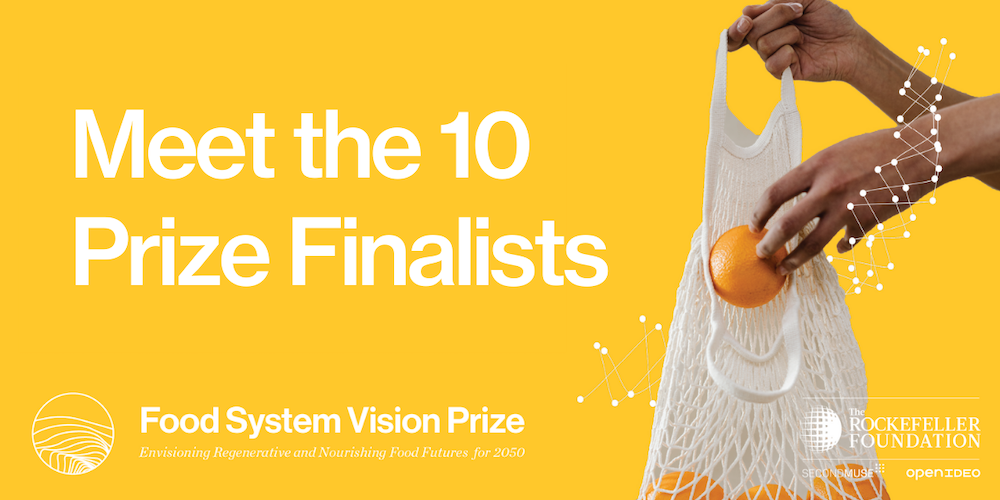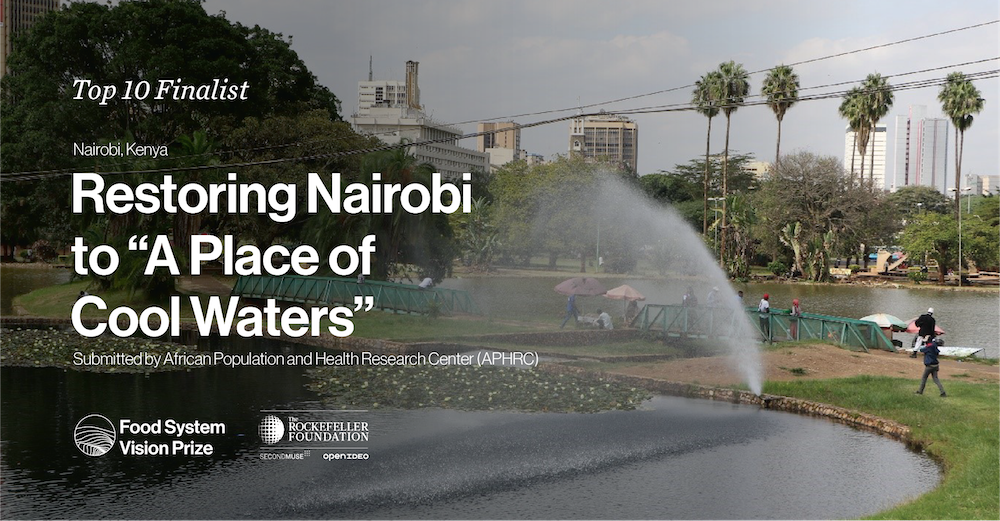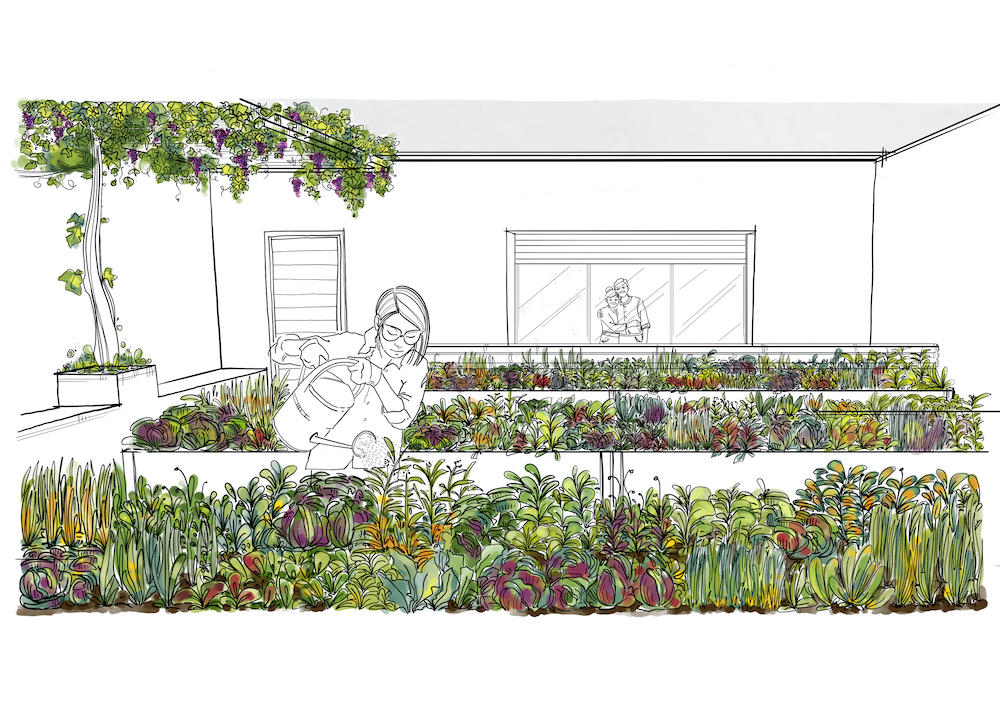Blog The Rockefeller Foundation’s Food System Vision Prize Finalists include Alliance partner, CIP

Ten ideas for local food system transformation have entered the final phase of the Food System Vision Prize, including a CGIAR partner organization in Kenya and the International Potato Center in Peru.
Fixing food systems is increasingly becoming a global priority. Our predominant means of food production and consumption are often detrimental to the environment and human health. As the globe’s population swells to 10 billion by 2050, the situation will worsen unless changes begin now. While global-level targets need to be established and met, community-level transformation will be key to aggregated success.
To spur ideas for food system transformation, The Rockefeller Foundation and partners launched the Food System Vision Prize last year. More than 1,300 visionaries proposed ideas. Of those, the ten Finalists were recently announced. The visions will be put into a “virtual accelerator” for three months, and each Finalist is eligible to become a Top Visionary and to receive a prize of $200,000 USD. Top Visionaries will be announced in December 2020.
Restoring Nairobi, Kenya, to “A Place of Cool Waters,” proposed by the African Population and Health Research Center (APHRC), is among the Finalists.

The APHRC has a long track record of working in Nairobi and has collaborated on projects with many organizations including the Alliance of Bioversity International and CIAT.
“I wish to congratulate APHRC for becoming a Finalist,” said Christine Chege, a food systems specialist at the Alliance’s Africa Hub.
“They are doing a great job steering the right to food discussions especially for the vulnerable consumers in urban Nairobi. I am excited to see that APHRC will start walking towards that vision they have envisioned for a long time.”
Chege added that the Alliance and APHRC share similar goals in addressing food system challenges in Nairobi. “Being in a partnership with like-minded organizations like APHRC is a very good thing because it strengthens our implementation capacity for food systems projects and together we can achieve sustainable systemic impacts,” she said.
APHRC’s vision is set in a race against time. Nairobi’s population is projected to grow from 4.7 million today to some 14 million by 2050. Food insecurity, malnutrition and over-nutrition are already major issues and are prevalent in the city’s informal settlements, where about two-thirds of the population lives. This nutritional emergency is unfolding against a backdrop of poverty, insecurity, poor sanitation and environmental degradation.
APHRC’s vision offers a timely, revolutionary, transformative approach to ensure a sustainable urban food system in Nairobi, taking into consideration the complexity of the food system. They propose four core actions as part of their vision:
- Increasing local food production in ways that regenerate the environment and preserve human, social and cultural values
- Reducing food loss through repurposing and redistribution
- Creating efficient connections between urban markets and rural food sources
- Facilitating economic empowerment through agribusiness
Research, policy support, advocacy for policy and consumer behavior change, and capacity building for youth and women in agribusiness will be key to making their vision a reality.

APHRC Food System Vision Team with members of Komb Green Solutions, a partner community based organization practicing environmental conservation and innovative urban farming in Nairobi.
Becoming an FSVP Finalist “was the most exciting news ever,” said Elizabeth Kimani-Murage, a researcher and public health specialist at APHRC who leads the proposal.
“This was the greatest thing that could happen toward my dream of making the right to food a reality for vulnerable populations.”
Kimani-Murage calls APHRC’s proposal a “human-centered food system vision” that she helped develop through two decades of living and working in Nairobi and seeing widespread food and nutrition insecurity. “I am determined to make a difference in a place that is now my home,” she said.
APHRC and CIAT were among the organizations that participated in developing the Nairobi Food Systems strategy, an initiative that was led by the government of Kenya to ensure a sustainable Nairobi city food system. APHRC and the Alliance are also partners in a European Union Horizon 2020 project called Healthy Food Africa. The project is establishing “Food System Labs” in 10 cities in six African countries. APHRC leads the Nairobi Food Systems Lab, while the Alliance leads the Kisumu Food Systems lab. APHRC is also collaborating on proposals with other CGIAR centers.
Strategic partners
The Alliance would also like to congratulate the International Potato Center (CIP) for its “Lima 2035” vision, which is also among the 10 FSVP Finalists. The project envisions tackling inequality to water access in Lima, which is considered the driest megacity in the world, and pioneering water harvesting from fog while addressing food insecurity by increasing food production in the city’s vast informal settlements.

The Alliance was one of the international NGOs that acted as a Strategic Network Partner for the FSVP. The center’s experts gave input on the prize and served as an evaluator of visions. However, the Alliance was not involved in selecting the 10 prize Finalists.
“The Alliance was honored to be part of a diverse, global process which aimed to recognize and also to help support ambitious, transformative, locally informed thinking that is critical to moving food systems toward doing what they should be doing – offering healthy and affordable food to all, in ways which do not deplete the environment or exploit others,” said Colin Khoury, one of the Alliance scientists involved in the FSVP partnership.
“The diversity of the Finalists certainly reflect the wide range of ideas and actions needed to take us there.”
Meet the other Finalists
With entries from five continents representing diversity from indigenous communities to modern megacities, the FSVP’s Finalists showcase the range of smart ideas that can help communities rise to the challenges of food system transformation. The Alliance congratulates all the Finalists and wishes them the best as they implement their food system visions.

Arakunomics, India
Arakunomics focuses on the regions of Araku, Wardha, and New Delhi to ensure food & nutrition for all, fair profits for farmers, and environmental sustainability. Learn more: https://bit.ly/3kimjPZ
Re-rooting the Dutch Food System, The Netherlands
Re-rooting the Dutch food system, a prize Finalist developed by Wageningen University and Research, imagines an inclusive food system in the Netherlands that is rooted in nature and society, replacing the current, linear food system with a circular one. https://bit.ly/3ib4XSZ
kwayeskastasowin wahkohtowin, Canada
Finalist “kwayeskastasowin wahkohtowin” aims to create a just and sustainable agrifood system while addressing the process of decolonization in Canada’s Treaty Four Territory. Learn more: https://bit.ly/2XxQcSn
7Gen Food System, USA
The FSVP Finalist “7Gen Food System” envisions re-establishing the Sicangu Lakota people of South Dakota, as primary stewards of their land, building a society in which food heals and unites people. Meet the team and explore their vision: https://bit.ly/31mI6gG
Food Innovation Nervecenter, Nigeria
What if thriving communities could nourish themselves through healthy meals that also replenish the Earth? This is the Food Innovation Nervecenter’s vision for Southwest Nigeria. Learn more: https://bit.ly/31iPHwG
Eat Right India
Eat Right India, a #FoodVision2050 Prize Finalist from @fssaiindia, wants to ensure that safe, healthy, and sustainable diets are accessible by 2050 through a #foodsystems approach that improves the health of all Indians. Learn more:https://bit.ly/2PuWApf
Stone Barns, USA
In the Hudson Valley, Stone Barns seeks to catalyze an ecological food culture that supports a thriving regenerative food and farm economy. Meet this FSVP Prize Finalist: https://bit.ly/31ruVv3
From Mama’s Kitchen to Metropolitan Beijing, China
The Good Food Fund imagines a plant-based dietary transformation that contributes to reductions in greenhouse gas emissions and pollution. Learn more: https://bit.ly/2PoW9wy
